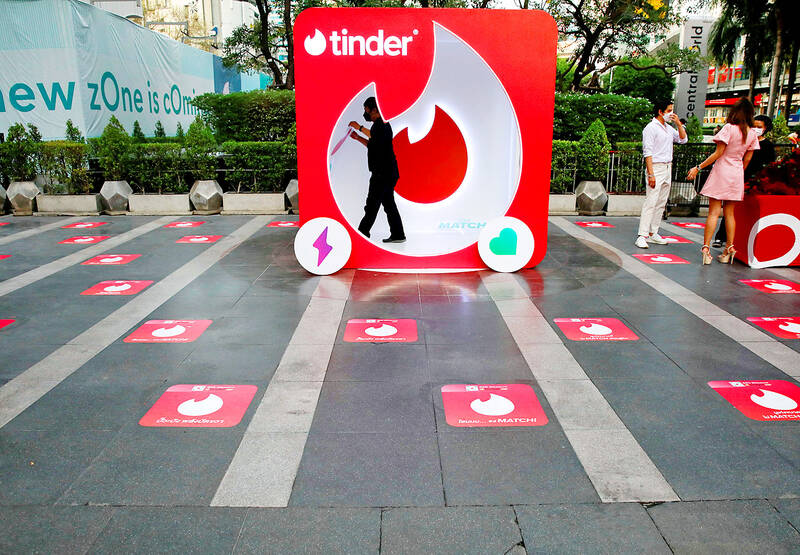Burnt-out love-seekers are shunning dating apps in their millions, but the apps are trying to woo them back with a counter offer: If you don’t want a lover, perhaps you just need a friend? The giants of the industry — Bumble and Match, which owns Tinder — have both created apps catering to friendly meetups, joining countless smaller platforms that have already entered the friend zone.
Bumble For Friends launched in July last year and by the third quarter of this year had around 730,000 monthly active users, according to figures from market intelligence firm Sensor Tower.
Bumble has also acquired the Geneva app, which caters to people wanting to form groups around particular interests.

Photo: Reuters
“It’s just the beginning of our vision to expand the company’s footprint and helping people find connections broadly,” Bumble CEO Lidiane Jones said during the Web Summit in Lisbon on Wednesday.
Match, meanwhile, launched the Yuzu app in February targeting the Asian community in the US, offering a choice between friendly or romantic encounters.
The group has also been testing a service dedicated to friendship in France on its dating app for older people, DisonsDemain.
Both firms have suffered dramatic slumps since the boom times of the pandemic, when millions turned to the apps during periods when governments restricted people’s movements.
‘APP FATIGUE
Sensor Tower said while Bumble For Friends was soaring, its dating app had shed eight percent of its monthly active users between the start of October last year and this year — the figure now standing at 21 million.
Tinder, by far the biggest dating app with around 53 million monthly active users, saw a 16 percent slump in the same period.
Seema Shah of Sensor Tower said users were feeling “app fatigue.”
“It’s affecting all apps but in particular these dating apps. People are just kind of tired of it,” she said.
Tinder was hit particularly hard as it targeted younger users between 18 and 22.
“This is the same age group that likes to do a lot of things in person,” she said.
These declines are hitting the firms where it really hurts — the wallet.
Match Group has shed more than US$40 billion from its value in three years.
Bumble achieved a valuation of more than US$20 billion when it went public in 2021, but it is now worth only about US$1.3 billion.
The firm announced the layoff of a third of its workforce in February.
And success in the friend zone is far from assured, with plenty of apps already battling to attract future BFFs.
NOVELTY FACTOR
The apps often cater to particular situations — WeRoad and TripBFF connect solo travelers, Wink and Plura help people find friends based on their interests.
French app Timeleft, launched last year, brings together six strangers every week for dinner at a restaurant.
The app has already organized dinners in 280 cities across 62 countries and is getting closer to profitability, said cofounder Maxime Barbier.
He said diners were assembled using an algorithm enriched by the results of personality tests taken by the users.
For Arthur Czubinski, a 32-year-old translator, it is a winning formula.
He said he had been to 12 dinners organized by the app in just a few months.
“Some of the tables have been incredible,” he said.
But Seema Shah suggested the first flushes of success for friendship apps were at least partly down to novelty.
She expressed doubt people would pay in the long term.
“It’s probably easier to find friends in your area if you join some activity or through your job,” she said.

In the March 9 edition of the Taipei Times a piece by Ninon Godefroy ran with the headine “The quiet, gentle rhythm of Taiwan.” It started with the line “Taiwan is a small, humble place. There is no Eiffel Tower, no pyramids — no singular attraction that draws the world’s attention.” I laughed out loud at that. This was out of no disrespect for the author or the piece, which made some interesting analogies and good points about how both Din Tai Fung’s and Taiwan Semiconductor Manufacturing Co’s (TSMC, 台積電) meticulous attention to detail and quality are not quite up to

April 21 to April 27 Hsieh Er’s (謝娥) political fortunes were rising fast after she got out of jail and joined the Chinese Nationalist Party (KMT) in December 1945. Not only did she hold key positions in various committees, she was elected the only woman on the Taipei City Council and headed to Nanjing in 1946 as the sole Taiwanese female representative to the National Constituent Assembly. With the support of first lady Soong May-ling (宋美齡), she started the Taipei Women’s Association and Taiwan Provincial Women’s Association, where she

Chinese Nationalist Party (KMT) Chairman Eric Chu (朱立倫) hatched a bold plan to charge forward and seize the initiative when he held a protest in front of the Taipei City Prosecutors’ Office. Though risky, because illegal, its success would help tackle at least six problems facing both himself and the KMT. What he did not see coming was Taipei Mayor Chiang Wan-an (將萬安) tripping him up out of the gate. In spite of Chu being the most consequential and successful KMT chairman since the early 2010s — arguably saving the party from financial ruin and restoring its electoral viability —

It is one of the more remarkable facts of Taiwan history that it was never occupied or claimed by any of the numerous kingdoms of southern China — Han or otherwise — that lay just across the water from it. None of their brilliant ministers ever discovered that Taiwan was a “core interest” of the state whose annexation was “inevitable.” As Paul Kua notes in an excellent monograph laying out how the Portuguese gave Taiwan the name “Formosa,” the first Europeans to express an interest in occupying Taiwan were the Spanish. Tonio Andrade in his seminal work, How Taiwan Became Chinese,